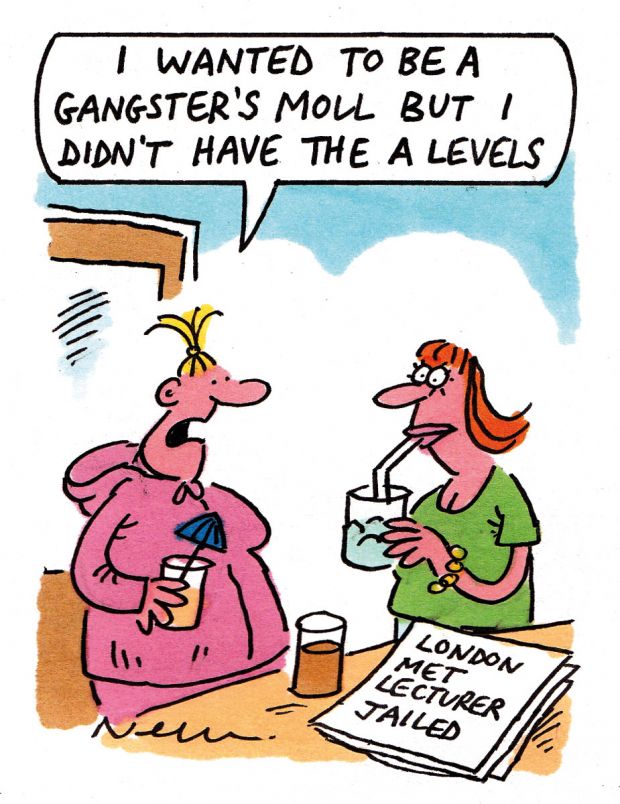
- Few academics hit the headlines like the London Metropolitan University lecturer jailed for helping her “gangster” boyfriend escape after he and two others “executed” a rival drug dealer. Rachel Kenehan, reported to have taught sociology and psychology at London Met, was described by a judge as a “gangster’s moll”. She was found guilty at Winchester Crown Court of assisting offenders, conspiracy to supply class A drugs and perverting the course of public justice, the London Evening Standard reported on 3 March. Kenehan “suffered a ‘spectacular fall from grace’ after she became ‘infatuated’ with Pierre Lewis who she met while carrying out charitable mentoring work for young offenders”, the newspaper said. Sentencing her to three and a half years in prison, Mr Justice Keith referred to Kenehan’s as yet uncompleted PhD – in criminology – and hoped she could “one day return to the field of criminology in which you have so much to contribute, with the advantage of the new perspective you will have, having seen the system in operation from the inside”.
- “Working-class children must be taught to think and act like the middle classes if they are to get into the best universities and top professions.” So ran the Daily Telegraph interpretation of a blog by Peter Brant, the head of policy at the government’s Social Mobility and Child Poverty Commission, in a front page story on 3 March. Mr Brant noted that other bloggers have identified barriers for disadvantaged youngsters such as “differences between working and middle-class lifestyles (eg, food, restaurants, clothes)”. He added: “It seems likely that worries about ‘not fitting in’ will be one reason why highly able children from less well-off backgrounds are less likely to apply to the most selective universities.” A background of grammar school and the University of Cambridge, before going straight into government, suggests that Mr Brant probably never had a problem fitting in.
- So many scholars strive for evidence that their ideas are recognised beyond the academy. They might rejoice when policymakers take up their research, or when a television documentary fires an audience with enthusiasm for their field. But for cosmologist Stephen Hawking, wider recognition has recently come from “nine revellers dressed as Bananaman”, who were out on a stag do. Chris Hallam and his friends persuaded Professor Hawking to stop for a picture during their night out, the Cambridge News reported on 3 March. “The picture was popular on Facebook, with one user declaring it ‘the best thing I’ve ever seen’,” the newspaper added.
- Guardian columnist Aditya Chakrabortty likened “fat cat” vice-chancellors to bankers “troughing for bonuses” on 4 March, drawing on analysis of pay packets by Times Higher Education. “In good times, they justify mega-pay as the going rate for ‘talent’. In bad times, they just take the cash…And as with the City, higher education’s new elite now receive repeated pleas from Vince Cable to rein in their excesses,” he wrote. But while “CEOs of public companies are answerable to their shareholders and customers”, there is no such accountability for vice-chancellors, Mr Chakrabortty added, urging that “senior management remuneration reports should be published before their discussion”. In the face of criticism by ministers, anger from university staff given below-inflation pay rises and scathing national newspaper coverage, there is one natural response from universities: even bigger pay rises for vice-chancellors next year.
- Hanif Kureishi seemed like such a happy-go-lucky chap when interviewed by THE in November after his appointment as professor at Kingston University (“I can’t believe you can’t think of better questions than this, dude, I really can’t”). But his sunny disposition does not always shine through, judging by comments at The Independent Bath Literature Festival. The author reportedly said of his writing students: “It’s probably 99.9 per cent who are not talented and the little bit that is left is talent.” He also said it would be “madness” to start as a writer by spending thousands on an MA in creative writing and that most writing teachers “are going to teach you stuff that is a waste of time”, The Independent reported on 4 March. A Kingston spokesperson said that Professor Kureishi was teaching an “extremely demanding and valuable course”.
Register to continue
Why register?
- Registration is free and only takes a moment
- Once registered, you can read 3 articles a month
- Sign up for our newsletter
Subscribe
Or subscribe for unlimited access to:
- Unlimited access to news, views, insights & reviews
- Digital editions
- Digital access to THE’s university and college rankings analysis
Already registered or a current subscriber?
Please or to read this article.
